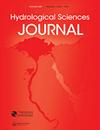Using climate information as covariates to improve nonstationary flood frequency analysis in Brazil
IF 2.5
3区 环境科学与生态学
Q2 WATER RESOURCES
Hydrological Sciences Journal-Journal Des Sciences Hydrologiques
Pub Date : 2023-02-20
DOI:10.1080/02626667.2023.2182212
引用次数: 1
Abstract
ABSTRACT Climatic drivers of floods have been widely used to improve nonstationary flood frequency analysis (FFA). However, the forecast ability of nonstationary FFA with out-of-sample prediction has not been comprehensively evaluated. We use 379 flood records from Brazil to assess the ability of process-informed nonstationary models for out-of-sample FFA using the generalized extreme value (GEV) distribution. Five drivers of floods are used as covariates: annual temperature, El Nino Southern Oscillation, annual rainfall, annual maximum rainfall, and annual maximum soil moisture content. Our results reveal that a nonstationary model is preferable when there is a significant correlation between flood and climate covariates in both the training period and full record. The rainfall-based covariates lead to better out-of-sample nonstationary FFA models. These findings highlight that using climate information as covariates in nonstationary FFA is a promising approach for estimating future floods and, hence, better infrastructure design, risk assessment and disaster preparedness.利用气候信息作为协变量改进巴西非平稳洪水频率分析
洪水的气候驱动因素已被广泛用于改进非平稳洪水频率分析(FFA)。然而,样本外预测的非平稳FFA的预测能力尚未得到全面评价。我们使用巴西的379条洪水记录,使用广义极值(GEV)分布来评估样本外FFA的过程知情非平稳模型的能力。洪水的五个驱动因素被用作协变量:年温度、厄尔尼诺南方涛动、年降雨量、年最大降雨量和年最大土壤含水量。我们的结果表明,当训练期和完整记录中洪水和气候协变量之间存在显著相关性时,非平稳模型是优选的。基于降雨量的协变量导致了更好的样本外非平稳FFA模型。这些发现强调,在非平稳FFA中使用气候信息作为协变量是一种很有前途的方法,可以估计未来的洪水,从而更好地进行基础设施设计、风险评估和备灾。
本文章由计算机程序翻译,如有差异,请以英文原文为准。
求助全文
约1分钟内获得全文
求助全文
来源期刊
CiteScore
6.60
自引率
11.40%
发文量
144
审稿时长
9.8 months
期刊介绍:
Hydrological Sciences Journal is an international journal focused on hydrology and the relationship of water to atmospheric processes and climate.
Hydrological Sciences Journal is the official journal of the International Association of Hydrological Sciences (IAHS).
Hydrological Sciences Journal aims to provide a forum for original papers and for the exchange of information and views on significant developments in hydrology worldwide on subjects including:
Hydrological cycle and processes
Surface water
Groundwater
Water resource systems and management
Geographical factors
Earth and atmospheric processes
Hydrological extremes and their impact
Hydrological Sciences Journal offers a variety of formats for paper submission, including original articles, scientific notes, discussions, and rapid communications.

 求助内容:
求助内容: 应助结果提醒方式:
应助结果提醒方式:


